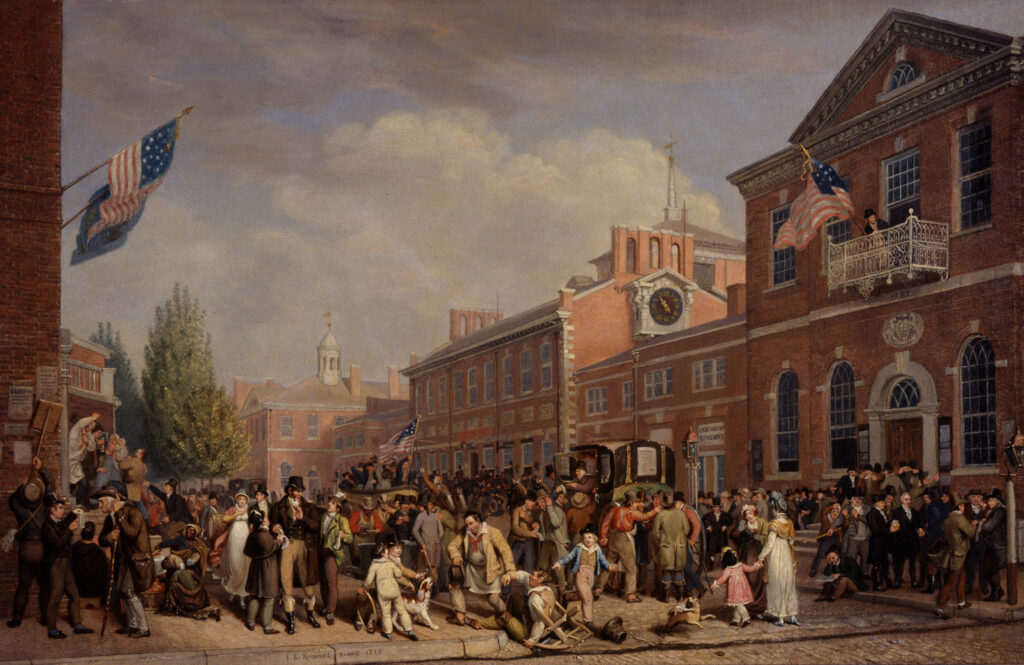[Greek] ψηφίζω (psēphizō), [Latin] calculare: to vote, to count, to compute, to calculate, to count with pebbles, to figure out: Lk.14:28, Rev.13:18

Election Day in Philadelphia 1815: painting by John Lewis Krimmel (1815). The people are gathered together waiting for the results of the election. This picture captures the festivities and excitement of elections in the decades that followed American independence.
Background information:
Greek Hellenism: This term means to count or calculate with a stone, to reach a verdict (decision), and to condemn. Small stones (psephos) were used in board games, counting, voting, astrology, and magic. A stone was synonymous with a voice (and opinion). The process of voting often occurred by placing a stone in an urn. Making a decision or having the resolve occurs in many situations and contexts. Political and government leaders vote (make decrees) with their authority. Voting often occurs in determining the innocence or guilt of a defendant.
Xenophon’s Hellenica 1.7.9: “Cast their vote (stone) into the urn.”
Herodotus’ The Histories 2.36.4: “Calculate from left to right.”
Sophocles’ Ajax 448: “Procured votes in judgment against another man.”
Aeschines’ On the Embassy 2.84: “Put the motion to a vote.”
Lysias’ Against Eratosthenes 12.44: “What measures be passed by their votes.”
Antiphon’s Against the Stepmother for Poisoning 1.12: “To find them guilty.”
Herodotus’ The Histories 5.97: “Had made their decision.”
Isaeus’ Pyrrhus 37: “Give your verdict.”
Ostracism: In a related matter with voting, the ancient Greeks sometimes voted whether or not to expel or banish a person from Athens. The Greeks voted with a broken pottery shard (ostrakon). Those persons, who were forced to leave, were ostracized.
Old Testament: This term means to reckon or count people, sheep, and cattle. The Hellenistic philosophers Philo and Josephus frequently make reference to reckoning or resolving. Examples include bestowing honors, seeking God’s counsel, achieving triumphs (exploits), implementing decrees, condemning and banishing criminals, and resolving to return home. I serve you in the midst of the people whom you have chosen, a people so vast that it cannot be numbered or counted (3Kgs.3:8). King Solomon and the entire community of Israel present for the occasion sacrificed before the ark sheep and oxen too many to number or count (3Kgs.8:5).
New Testament: This term, found only twice, means to calculate and to figure out. Jesus begins with discussing what it means to be a disciple. This requires removing attachments to family (and possessions) which stand in the way for a total commitment for being a disciple. This acceptance demands readiness to accept persecution and suffering. Like calculating the costs of constructing a tower, this decision requires a realistic assessment of the hardships and costs for such a commitment. Wisdom is needed to calculate the number of the beast, whose number is 666. The number 6 represents man, imperfection, incompleteness, and evil. Evil, in its most superlative form, personifies Satan.
Scripture
“Which of you wishing to construct a tower does not first sit down and calculate the cost to see if there is enough for its completion?” Lk.14:28
Constructing the cost of a tower is likened to understanding what it takes to become a disciple. One must understand and accept the costs needed in order to be a disciple of Jesus.
Conclusion:
Calculate, calculation
It was interesting to discover that the ancient Greeks used stones (pebbles) in settling and deciding important matters. Not surprisingly, stones were also used in board games. Aside from stones, I found many examples pertaining to making decisions, condemning prisoners, and implementing decrees.
This term is used less frequently in the Old Testament. However, the Hellenistic philosophers Philo and Josephus make frequent references to resolving and decreeing.
Jesus essentially lays out the necessary qualities needed in order to become a disciple. For some, these are high costs (renouncing possessions, leaving family ties, and experiencing hardship and persecution). It is not surprising that Satan is associated with the number 666. It is very interesting to note that in Jn.6:66, many disciples walked away when Jesus claimed that one must eat His Body and drink His Blood. In a sense, you could say that the devil made the disciples walk away. (The devil made them do it?)
WARNING—USELESS WORDS ALERT– (These words certainly get my vote for this distinction!)
Psephology: the statistical study of elections and trends in voting.
Psephologist: one who studies elections and electoral trends. (Frank Luntz, Karl Rowe, Larry Sabato, Nate Silver )
Ostrakon: pottery shard used in voting.
Update: Many of us are anxiously awaiting the findings from the forensic audit in Maricopa County Arizona. It is also very curious that we continue to learn more and more information (articles) of test ballots, lawsuits, ballot harvesting, video evidence of questionable of election officials. flash drives, modems, lack of chain of custody, whistleblowers, lost ballots, etc. in “the most secure election” in American history. It just keeps happening. We are always waiting for the next story of something concerning about the election. You can always count on it!
